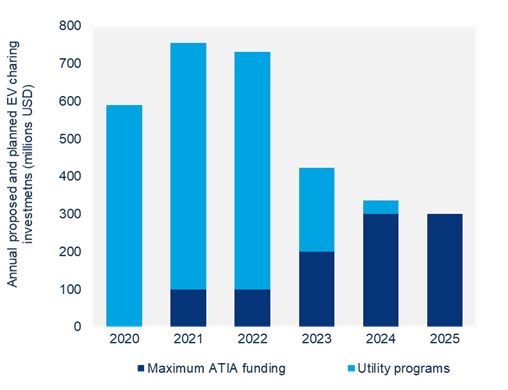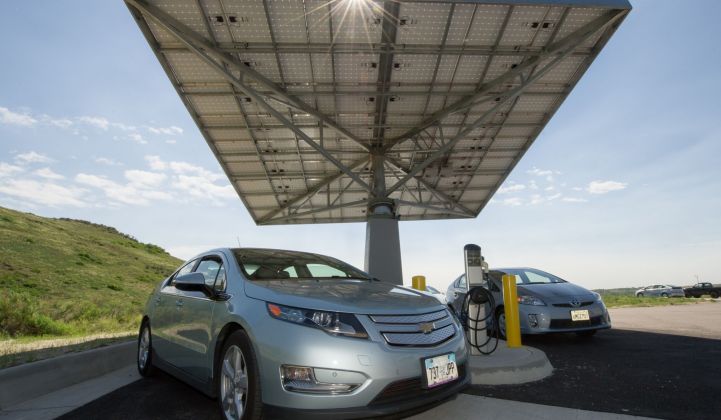The U.S. Senate Committee on Environment and Public Works introduced and unanimously advanced a sweeping transportation bill this week that would provide a major funding boost for EV charging infrastructure and other initiatives aimed at curbing carbon emissions from the transportation sector.
The America's Transportation Infrastructure Act of 2019 (ATIA) proposes investing $287 billion in federal transportation projects over the next five years, a 27 percent increase over existing legislation set to expire in October 2020.
In addition to funding for roads and bridges, the bipartisan bill includes $3 billion to support projects that lower highway-related carbon emissions, such as efforts to reduce traffic congestion and provide alternatives to single-occupant vehicle trips. States can compete for an additional $500 million by making progress on lowering their per-capita emissions.
The bill also includes a competitive grant program funded at $1 billion over the five-year period for states and localities to build hydrogen, natural-gas and EV fueling infrastructure along designated highway corridors. While the funds are not dedicated exclusively to EV charging, market demand is likely to drive investments in EV infrastructure over the alternatives.
"With over 1.2 million electric vehicles in North America at the end of 2018, a nearly 48 percent increase from 2017, the need for expanded electric vehicle charging infrastructure is greater than that of the other two fuels,” said Ben Kellison, research director at Wood Mackenzie.*
Even a plurality of funding from the grant program "would offer a significant boost to public funding for EV charging stations," he added.
Using EV charging investments from the largest 120 utilities in the U.S. as a point of comparison, the ATIA’s proposed $1 billion grant program increases proposed and approved utility and federal funding by nearly 47 percent through 2025 — raising that figure to a combined $3.13 billion, according to Kellison.**
Projected EV Charging Investments From Utility Programs and ATIA

Source: Wood Mackenzie Power & Renewables
While private owners and operators are expected to continue building out EV infrastructure, state-level programs have shown there is a convincing case to be made for public investment, he continued. The New York Power Authority’s $250 million EV initiative, for instance, is helping to combat range anxiety among current and prospective EV buyers wary of traveling between major urban hubs by deploying DC fast-charging stations in key areas.
“Funding proposed by ATIA could alleviate the financial difficulties of erecting and operating DC fast-charging infrastructure in a market that is rapidly growing but has yet to reach the critical mass to offer profitability to the majority of potential fast-charging locations,” Kellison said.
Nick Nigro, founder of the EV industry research firm Atlas Public Policy, noted that increased public investment in EV charging also stands to drive greater private-sector activity.
"A $1 billion infusion from the federal government into EV charging infrastructure will send a strong market signal to the private sector that the United States is serious about transportation electrification," he said.
Adding EV charging investments from the Volkswagen "Dieselgate" settlement on top of the ATIA grant proposal and already-announced electric utility programs could bring total U.S. investments in infrastructure for EVs to $6 billion in the near term, according to Nigro.
Electric vehicle fees?
The transportation legislation was introduced Monday by Environment and Public Works Committee Chairman John Barrasso (R-Wyo.), along with Ranking Member Tom Carper (D-Del.) and Senators Shelley Moore Capito (R-W.Va.) and Ben Cardin (D-Md.).
Barrasso’s support for the bill’s EV charging program came despite his previous calls for ending federal EV tax credits. He told reporters last week: “If you have an established market, you need infrastructure so it can be used, but it doesn't need more tax subsidies to subsidize the purchase of those vehicles," according to Politico.
He also called for “some sort of user's fee” for the wear and tear that electric vehicles have on the roads. National transportation infrastructure historically has been funded through the federal gas tax, which has produced declining revenues over the past decade due to increasing vehicle fuel efficiency and the rise of EVs.
According to E&E News, lawmakers have yet to identify funding sources to cover the cost of the ATIA. EV advocates are hopeful that support for alternative fuel vehicles will not be undermined by new fees to pay for legislation.
“This is just the beginning of the process,” said Jason Hartke, president of the Alliance to Save Energy, in a statement. “Congress will need to ensure that funding mechanisms for the bill generate revenues from all vehicles impacting our infrastructure while not undermining the future growth of energy-efficient vehicles, including electric vehicles.”
This story has been updated
*This sentence has been corrected to reflect numbers for North America. Originally, it erroneously cited numbers for China, which had over 1.75 million electric vehicles at the end of 2018, a nearly 60 percent increase from 2017.
**This sentence has been corrected to read 2025. It originally said the ATIA’s proposed $1 billion grant program increases proposed and approved utility and federal funding by nearly 47 percent through 2024.




